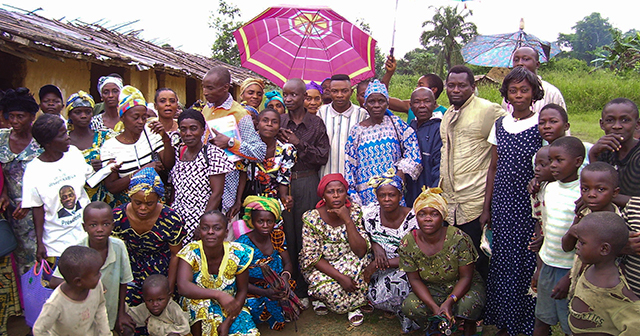This article was published more than 8 years ago.

Imagine giving birth to a healthy baby, but being unable to prove that the infant is yours. Imagine your child, older now, being refused enrollment in school and denied healthcare.
For many new mothers living in the Democratic Republic of the Congo, this is an everyday reality. All because their children don’t have birth certificates.
While Congolese law requires families to register their newborns within 90 days, this can be a near-impossible task, especially for poor parents and those living in remote areas. Civil registration offices – which provide birth certificates – are sparse and under-resourced. Even worse, staff often require bribes to provide certificates and parents seldom have the information they need on how to register their children.
But what happens if you decide to register your child after the 90-day mark? Families are forced to obtain a special court ruling and pay a hefty fee, a penalty that causes many parents to forgo registering a baby that is older than three months.
As a result of these challenges, only about 25% of Congolese children are properly registered. This means that only a quarter of the country’s children are recognized before the law, the first step in protecting a child’s economic and social rights and future political and civic participation.
Birth certificates are more than just legal documentation – they ensure that children have access to basic services like healthcare, education, and social security. Legal recognition of a child’s age on a birth certificate can also protect them from child labor, child marriage, trafficking and exploitation, and conscription into the armed forces. And, birth certificates can help reunite children separated from their families and ensure safe migration across borders.
While the value of obtaining a legal identity is clear, the question remains of how to secure them for DRC families. For Fund grantees working in the Congo, one solution was obvious: enable the fiercest advocates of children they know, the mothers.
Working with Mothers to Get the Documents They Need
Several Fund grantees in the DRC are doing exactly that, educating mothers on the importance of obtaining a birth certificate for every child. Taking advantage of areas where women gather – markets, places of worship, and shops – they organize information sessions on how to register a child, stressing that these services should be provided free of charge. Beyond just information, they also accompany new mothers to registration centers, especially in cases where officials demand bribes.
Fund grantee Office of Scientific and Technical Studies (BEST) is currently piloting a project to obtain birth certificates for infants who are older than three months. Further west in the Maniema province, the Maniema Young Women’s Association (AJFMa), helps women in rural areas learn why obtaining legal documents for their families is so important. The organization then helps women secure these documents so they can protect their rights and the rights of their children. In town hall gatherings and trainings throughout the year, AJFMa helped thirty-nine mothers get birth certificates for their children in the towns of Kalima and Samba.
Protecting the Most Vulnerable Children
It’s difficult enough to obtain a birth certificate for families in the DRC, but the most vulnerable children are those who go unregistered for more than 90 days and those born of rape. Mothers of children born of rape particularly struggle to obtain birth certificates due to requirements that both parents’ names appear on the certificate, and because of societal stigma.
To address this, grantee Solidarity and Exchange for Integrated Development (SEDI) focuses on helping mothers who are victims of sexual violence obtain legal documentation for their infants. SEDI recently obtained birth certificates for ten children born of rape where the father’s identity was unknown. They also provide ongoing legal assistance to the women survivors of sexual violence.
The Fund has provided grants to organizations working on women’s and children’s rights in the DRC for more than a decade. The Fund has supported AJFMa since 2005, BEST since 2013, and SEDI beginning in 2011.


